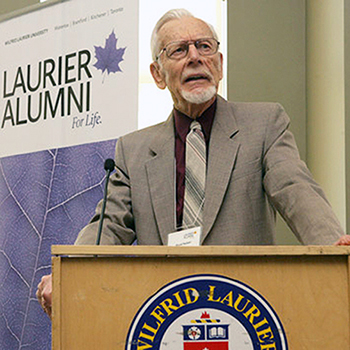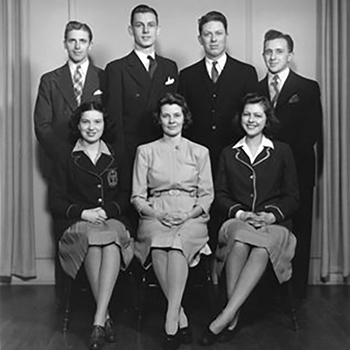What follows is both an expression of appreciation and a reflection on the key role WLU played in my life experience. From my current vantage point of 99 years, I can say that my experiences at WLU were, and still are, intimately connected to my wide-ranging opportunities and what some might call achievements.
In 1942, with mingled hope and deep hesitancy, I enrolled at Laurier’s predecessor, Waterloo College. It meant leaving my comfortable niche in the insurance business for the uncertainty of returning to studies that had seemed so boring. In high school, social events always had more appeal than academic work. But enrolling at the college also represented new challenges, beckoning horizons and the possibility of finding a deeper purpose.
Was the choice right? The question was posed when we students faced a test in European medieval history. What a blow to see that F (39 per cent) staring at me when the paper came back! My option was to drop out – join the Armed Forces or take some decent job – so avoiding further embarrassment.

Ward L. Kaiser speaks during a visit to Laurier in 2014.
Then a conversation with the course professor produced a surprise: she urged me to stay on, saying that the test would count for very little in the final grade, being outclassed by a term essay and the final exam. So – maybe?

Ward L. Kaiser, second from right in the back row, pictured with Waterloo College colleagues and Professor Margaret Evans (nee MacLaren), pictured at centre in the front row.
A second surprise soon followed. An aptitude test interpreted by a psychology professor seemed to say I could handle any course in the school’s curriculum. That’s when I objected, citing my still-stinging grade in history. The counsellor was not persuaded, holding fast to the reliability of his documentation. He even hazarded some guesses about the reason for my F grade and possible remedies. That hour of counselling proved pivotal. I became hopeful, even poring over books with titles like “How to Study.”
A term paper in history soon demanded my attention. Then came the next surprise: my essay came back graded A+. The professor explained that this was not only an outstanding paper, but the first A+ she had ever given in the course. To my astonishment, my final grade for the semester was an A. So in a short period of time, I found myself dragged through two warring extremes. I had been operating on the assumption that I had very limited ability, so my F grade in history seemed to confirm that and came close to determining the trajectory of my life. But the psychology professor was confident in his assessment that I could do the work. He suggested that I had not learned how to study, that I was not motivated and that I was too focused on things other than scholastic achievement (which I took to be true).
That is a quick summary of the turnaround that occurred in my days at Waterloo. Overall, I did well – becoming, for example, the first recipient of the William James Veitch Prize in Philosophy. Above all else, I thoroughly enjoyed my WLU days, both in class and extracurricular activities.
The years following graduation brought fresh challenges and rewards, including graduate studies at Emmanuel College (University of Toronto), at Columbia University and Rutgers University. I earned an MDiv at Union Theological Seminary.
Work opportunities led me to pastorates in Saskatchewan and Ontario, a staff position within the National Council of Churches and a long-time role as executive director and publisher of Friendship Press in New York. During this time, I was involved in an inter-church initiative on Catholic-Protestant relations, which resulted in a unit of the Catholic Church joining a unit of the (Protestant) National Council of Churches – the first such action since the Reformation. Following the Second World War, I was a team worker and regional director with CIMADE, a French refugee organization. I wrote five books and contributed to seven, including official publications for Canada’s centennial and the U.S. bicentennial. I also wrote a Bible commentary that was published in weekly installments over a six-year period.
– Ward L. Kaiser
Over the years, my work has enabled me to travel to much of Western Europe, Japan, the Middle East, Cuba, Nicaragua, Nigeria, Côte d’Ivoire, Fiji and Australia. I’ve given lectures and workshops on cartography, highlighting history-making equal area maps of the world at New York University, Princeton, the New Jersey Institute of Technology, Monmouth College, on National Public Radio and in Germany.
Is there a take away from this? You decide. For me, it would seem clear that:
• Faith matters. And honest affirmation.
• Justice counts. So I have worked for fair housing opportunity for all regardless of race, nationality and economic background. If that sounds normal to you, to others it once came across as so over the line that it brought serious threats. But it was worth it!
• Service matters. My professional and volunteer work among the vision-impaired and with incarcerated youth through the NYC Department of Corrections made a difference.
• Good education is worth it. How fortunate you are!
• Through it all, and as long as you live, enjoy!
Beyond question, my experiences at Waterloo College were pivotal in my life and career. Everything that followed my time there can be understood from that perspective. Before Waterloo College, I never would have imagined my life enriched by so many varied and challenging experiences. And I am confident that Wilfrid Laurier University continues in this tradition, providing practical support, inspiration and direction for many, whatever their need.
“Laurier we’ll praise thee ever, as in days of old...”
Ward L. Kaiser (BA ’45)
Alumnus of the Year 1967